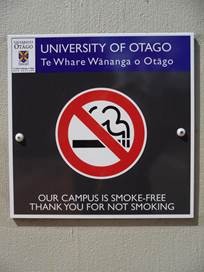The progress public tertiary education institutions (TEIs) have made towards becoming completely smokefree should encourage other New Zealand workplaces and institutions to follow suit, new University of Otago research suggests.
In this study reviewing smokefree policies and their implementation in universities, polytechnics and wānanga as of August 2012, ASPIRE2025 researchers found that half of the 29 TEIs had either already adopted, or were actively progressing towards, a 100% smokefree status.
Study co-author Lindsay Robertson says that officials interviewed at institutions with a 100% smokefree policy, which bans smoking anywhere on campus, tended to report that there had been little resistance from staff and students when the policy was implemented.
New Zealand’s progress towards becoming a smokefree society was cited by officials as one of the main reasons for developing a 100% smokefree policy.

“They also reported that having designated smoking areas on campus was more difficult to manage than being completely smokefree – it was actually easier for them in the long run to go smokefree,” Miss Robertson says.
Some campuses reported that staff members had successfully quit smoking after such policies were introduced.
She says that other benefits of this kind of policy, rather than just a partially smoke-free campus, include better protection from secondhand smoke and long-term denormalisation of smoking.
“The increasing number of TEIs becoming completely smokefree is an encouraging and important step towards the Government’s goal of a smokefree New Zealand by 2025.”
Miss Robertson and her co-author Dr Louise Marsh concluded that “overall, these results should support and encourage TEIs in New Zealand, as well as other workplaces, to develop 100% smokefree policies.”
For more information, please contact:
Lindsay Robertson
University of Otago
email lindsay.robertson@otago.ac.nz